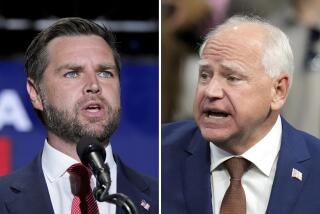Risky, This Debate Business
- Share via
SAN FRANCISCO — I confess I came up here with purposes cynical. It was my aim to attend the first-ever television debate between Democratic candidates for governor and examine the entrails for evidence of shallowness and lack of the vision thing. It looked like an easy day’s work.
I was encouraged in my truth-squadding by a colleague who has labored long in the political fields. “C’mon up,” he said with a wink. “You can’t miss. They’ll never mention Medfly. They’ll ignore our crumbling infrastructure.”
Oh, goody, I thought. I would pillory The Feinstein and The Van de Kamp for their miserable failure to produce Medfly commentary and infrastructure hoopla. I would make ironic contrasts between these etherized candidates and the likes of, say, Vaclav Havel in poor but now-ascendant Czechoslovakia. Havel, of course, will discuss infrastructure at the drop of a hat.
There was potential here.
So I came to San Francisco, turned on my tape recorder, and waited for all the stuff that wouldn’t get talked about. Only, it turns out, that wasn’t the problem.
The problem is, they did talk about it. And talk, and talk, and talk.
OK, maybe they did ignore Medflies. Surely no other subject was spared by these two people, who sounded like they had been deprived of Wheaties as children and fed shredded Caltrans reports instead. How did they learn to talk like that?
Want some examples? I got examples.
Feinstein announced herself aggressive on appointive gender balancing and foursquare behind preservation of set-asides for municipal contracts. She fence-straddled on indeterminate sentences, warned that the possibility of judicial commutation should be expunged, and really pounded COLAs. This last item was not a reference to Pepsi.
Van de Kamp liked Propositions 68, 98, 111, 112, and several others yet to be numbered. (Pop quiz: Tell me all you know about Prop. 68.) He grew lyrical over Transitional Assistance from the Peace Dividend. And, in fiery defiance of Feinstein, he announced his loyalty to COLAs.
Here’s what Feinstein said when asked if she would cut COLAs to meet a possible state shortfall of $3 billion. This reply, incidentally, was the first question of the night and came at the moment when most viewers were trying to decide whether to stick with the debate or switch to the Simpsons. Here it comes:
“Let me try to answer this way. I think if the shortfall is $3.3 billion, even if Prop. 111 passes, the upward computation will only allow about a billion dollars of additional spending. Consequently, $1.5 billion will have to be cut from the budget.”
For the record, Van de Kamp thought this response was “absolutely wrong.”
In truth, the whole thing was not as bad as that exchange makes it sound. For the hundred or so viewers who stuck it out past the first question, the debate did have its moments. And it proved why these events, as awkward and clumsy as they are, can sometimes provide the turning point in a political campaign.
Toward the end of their hour, Van de Kamp turned to Feinstein and played a card he had been holding back. He referred to comments that Feinstein had made to John Balzar, a political reporter for this newspaper, that suggested she might support laws banning abortions performed for the purpose of sex selection.
A touchy business. The notion of sex selection abortions obviously was repugnant to Feinstein, but freedom of choice for women has formed a cornerstone of her campaign. If she admitted during a live debate that she favored calling in abortion cops to interrogate women about their motives, she was running the risk of losing a chunk of her support.
So she waffled. Such abortions were wrong, she said, but pointed out that her comments had been made in response to a question about China, where the practice was once widespread. The question of an abortion inquisitor for California was left unanswered.
Was a lot of damage done? Probably not, because such abortions are still rare in this country. But if you watched the debate, you got to see this weak point develop in Feinstein’s campaign armor and you got to see the uncertainty and ambivalence in the candidate’s face as she tried to grapple with it.
And that is the value of the debates. Almost alone among all modern campaigning devices, debates create an environment of true risk. They are unpredictable and dangerous. And that makes them worth watching, even if the candidates don’t get to the Medfly, even if they seem, sometimes, to speak in a foreign tongue.
More to Read
Get the L.A. Times Politics newsletter
Deeply reported insights into legislation, politics and policy from Sacramento, Washington and beyond. In your inbox twice per week.
You may occasionally receive promotional content from the Los Angeles Times.










